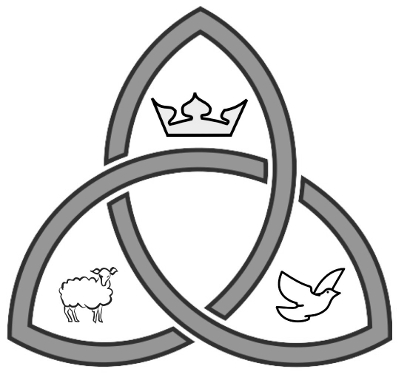Trinity Season
© 06.12.17 By David Eric Williams
 This past Lord's Day we celebrated Trinity Sunday. Trinity, the longest season in the Church year, begins the Sunday after Pentecost and runs right up until Advent. Although most people know something about the Church year (Advent, Christmas, Epiphany, Lent, Easter, Ascension, Pentecost and Trinity), very few are aware of the significance of Trinity season (or Trinitytide).
This past Lord's Day we celebrated Trinity Sunday. Trinity, the longest season in the Church year, begins the Sunday after Pentecost and runs right up until Advent. Although most people know something about the Church year (Advent, Christmas, Epiphany, Lent, Easter, Ascension, Pentecost and Trinity), very few are aware of the significance of Trinity season (or Trinitytide).
Trinity is important because it is the season when Christians are called to walk out the story of salvation as told in the rest of the Church year. In liturgical churches, the color green is emphasized. This of course symbolizes growth. Indeed, creation itself testifies to the growth of Christ's kingdom as the gospel rolls forward throughout the ages. So green vestments, green hangings – green grass, green leaves and so on – all draw attention to our responsibility to bring our life and arena of activity under the lordship of Jesus Christ. We are called to do so not only as individuals but as families, and local fellowships.
The last Sunday in Trinity is called Sunday of Christ the King. This is the Sunday declaring the final victory of Jesus Christ and his Gospel. It is a Sunday to celebrate the complete realization of the kingdom of God in Christ. This is not a celebration of the return of the Lord Jesus but a celebration of the victory of the Gospel in this current age. It is a time we rejoice that one day the earth will be full of the knowledge of the LORD as the waters cover the sea (Isaiah 11:9, or as the New English Translation says, there will be universal submission to the LORD's sovereignty, just as the waters completely cover the sea).
Part of the Lectionary reading for the first Monday in Trinity is from Psalms chapter two and says, why do the nations rebel and the peoples plot in vain? The kings of the earth take their stand, and the rulers conspire together against the LORD and His Anointed One: "Let us tear off their chains and free ourselves from their restraints." The One enthroned in heaven laughs; the Lord ridicules them. Then He speaks to them in His anger and terrifies them in His wrath: "I have consecrated My King on Zion, My holy mountain." I will declare the LORD's decree: He said to Me, "You are My Son; today I have become Your Father. Ask of Me, and I will make the nations Your inheritance and the ends of the earth Your possession. You will break them with a rod of iron; You will shatter them like pottery." So now, kings, be wise; receive instruction, you judges of the earth. Serve the LORD with reverential awe and rejoice with trembling. Pay homage to the Son or He will be angry and you will perish in your rebellion, for His anger may ignite at any moment. All those who take refuge in Him are happy (Psalms 2:1-12 HCSB).
In my last article I said that "nations and other corporate institutions are judged in this world not the next simply because national identities are eliminated in eternity." Psalms chapter two recognizes this principle. It is in this age that nations are called to submit to Christ the king. The universal submission noted in Isaiah 11:9 is not something that happens after the second coming nor is it a circumstance just over the historical horizon. Instead it is the result of a long steady progression in kingdom influence. It will only happen after generations of Believers have learned to bring their life and sphere of responsibility under the lordship of Jesus. Each generation must learn from the past and improve upon the heritage they receive.
It will be a long time from now before the nations respond to the warning of Psalms chapter two. This won't happen until the leaven of the kingdom has been worked throughout the whole lump of national dough.
More on this topic next week.
Entire Site Copyright © 2025 By David Eric Williams










